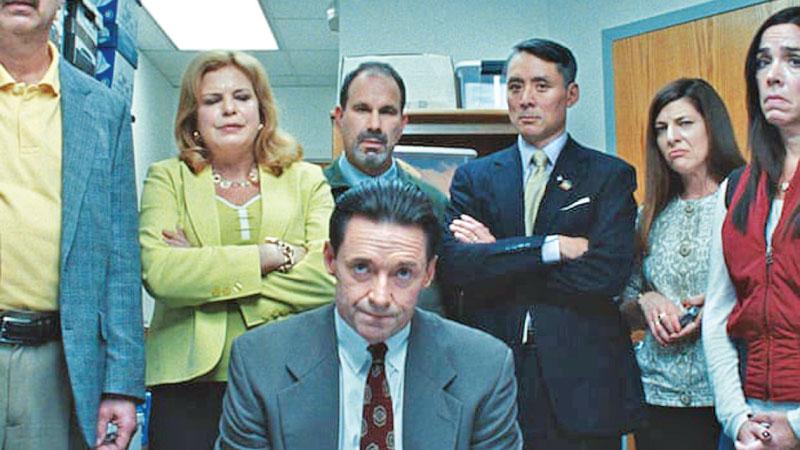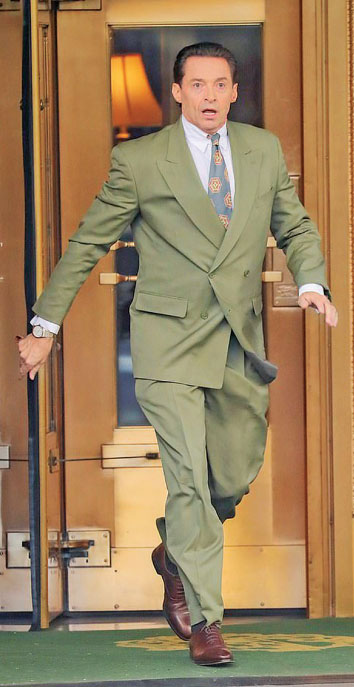
With his stylish, misanthropic debut Thoroughbreds, the writer-director Cory Finley arrived on the scene with undeniable, if slightly unrefined, talent. It was the kind of first movie that made you excited to see where he might go next, successful enough to suggest that better things were waiting around the corner. With his follow-up, the darkly comic drama Bad Education, he has stepped up in terms of scale and ambition, telling a fact-based story of brazen high school embezzlement with a more star studded cast at his disposal. But like his first film, it’s the work of someone still finding their footing, a few degrees away from something worth truly shouting about.
Like three other films also showing at this year’s Toronto film festival, it’s based on a long-read feature, a growing trend that often pushes unusual, under-reported stories even further into the spotlight. The case at the centre of Bad Education is a classic example, a scandal that might have gained traction locally but remains unknown to many. It is 2002 and Frank Tassone (Hugh Jackman), a much-loved school superintendent, is determined to push Long Island’s Roslyn High to the top of the area rankings and has helped push for the construction of an elaborate 'sky walk' to help boost the school’s image. Rachel (Geraldine Viswanathan), an eager student reporter, is assembling what she calls a 'puff piece' for the school paper about the plans but after interviewing both Frank and his assistant superintendent for business, Pam Gluckin (Allison Janney), she discovers that there’s something afoot.
For a long stretch of Bad Education, we’re not really sure where the film is going or even what the film is, whether we’re in darkly comic Election territory or something more straightforward and dramatic.
At times, I wasn’t entirely convinced that Finley and the screenwriter, Mike Makowsky, were sure either, with a shagginess that borders on aimlessness, but their decision to skate so close to banality slowly pays off. We’re invested in the district’s dull bureaucracy as the thread starts to unravel, and it unravels in often un-cinematic ways, as does life. What is most refreshing is how the pair avoid turning their characters into grotesque caricatures, something that a less humane film would have easily done. The wrongdoers, whose slow, increasingly unhinged, theft of school funds gets revealed, are closer to pathetic than evil.
While it’s never exactly dull watching Janney repeat her quippy, alcohol-soaked, Oscar- and Emmy-winning shtick, it’s a relief to see her dialled down here. She’s wonderfully restrained and utterly credible playing a woman whose only real motivation wanted more from life, and Makowsky avoids the need to justify or excuse her behaviour. There’s also a strong turn from Viswanathan as the student whose reporting uncovered the depths of corruption, and her character is presented in an equally plain manner: she’s plucky without being Nancy Drew and with this and the Sundance hit Hala, her star is definitely on the rise. But the film’s real ace is a never-better Jackman, following up an underrated turn in last year’s The Front Runner with another difficult and inscrutable protagonist. It’s fascinating character work for reasons it would be unfair for me to reveal (even though it’s easily Google-able) but there are hidden, tragic depths and it’s one of the best performances we’ve ever seen from him as he appears to be thriving in a challenging and thrilling new phase of his career.
Makowsky shows us how people attempt to justify their own bad behaviour when they don’t think of themselves as bad people. There’s an unspoken arrogance often attached with working in a system that’s ultimately helping others to succeed, and in the film it acts as a weak defence of amorality, as if they’re somehow owed something. It’s a slight movie at times, unfocused at others, even plodding in parts, and I didn’t leave the cinema entirely convinced that it was the most satisfying way to tell this particular story. But I did leave feeling confident in both Jackman’s prowess and Finley’s promise, yet to be fully realized.
